Babcock today announced it will lead a team of industry partners in a bid for the new £1.25 billion Type 31e Frigate with work to be undertaken in Scotland, England and Northern Ireland.
Babcock say work would be shared across the UK its facilities in Fife and Devon being among the prime locations for building. Ferguson Marine on the Clyde will also be in line for the work.
The build plan for the Type 31 Frigates is expected to follow a similar pattern to that of the Queen Elizabeth carriers and early Type 45 Destroyers in that blocks will be built in yards around the UK and assembled at one main location.
Modern shipbuilding makes considerable use of prefabricated sections. Entire multi-deck segments of the hull may be built elsewhere around the UK, transported to the building dock or slipway, then lifted into place and assembled into one ship. This is known as block construction and is far more cost effective. Yards pre-install equipment, pipes, electrical cables and any other components within the blocks, to minimise the effort needed to assemble or install components deep within the hull once it is welded together.
Babcock will act as the overall programme lead, whilst Thales will have overall responsibility for the development of the Mission System solution. The make-up of the team, the company say, will ensure that the economic benefits of the programme are shared across the UK. Ferguson Marine on the Clyde, Harland & Wolff in Belfast and the Babcock facilities in Fife and Devon will all have ‘key roles to play’, while much of the equipment provided by Thales and others will support jobs across the UK.
Babcock CEO Archie Bethel said:
“Team 31 will allow Babcock and Thales to take forward the key lessons from the Aircraft Carrier Alliance and apply them in a new and highly capable team with Harland & Wolff, BMT and Ferguson Marine. We firmly believe that our combined skills can deliver an affordable and effective Type31e Frigate programme for the Royal Navy and offer something new and exciting in the export market. With a high degree of UK content and the use of innovative technologies, we believe that our approach will deliver real benefits to UK plc.”
Victor Chavez, CEO of Thales UK said:
“Thales UK is delighted to be working with Babcock and our partners as part of Team 31. We recognise the diversity of roles anticipated for Type31e and, together, we will create and exciting, innovative and flexible capability for the Royal Navy based on the best of UK and international technologies in an open-system architecture that will ensure long term value for money.”
Sarah Kenny, BMT CEO said:
“BMT has supported the UK and global maritime sector for decades. As a proud member of Team 31, we are delighted to be shaping the Type 31e programme, and we welcome the opportunity to bring our substantial global engineering experience to bear on this vital UK defence programme. We are confident that the combined Team 31 offering will meet the exacting requirements of the UK MOD whilst creating UK shipbuilding industry momentum and a competitive offering for wider export opportunities.”
Babcock were originally offering the ‘Arrowhead 120 while BMT were offering the Venator 110, the companies now say that they will be exploring both available designs to determine the best possible option. The companies say that new arrangement draws on combined strengths and will deliver ‘innovative, capable, affordable and flexible customer solutions, within a fast changing and increasingly demanding environment’.
As we reported last year, BAE Systems announced a partnership with Cammell Laird, who would ‘Prime, build and assemble’ the vessels at their Merseyside facility while the Clyde will focus on the Type 26 Frigates. If the bid is successful, Cammell Laird would be main contractor with BAE providing design and combat systems.
BAE themselves say that shipbuilding capacity on the Clyde will be full until the mid 2030s while the Ministry of Defence want the first of the new Type 31 Frigates in service by 2023.
The MoD is hoping to reduce its reliance on BAE and cut the costs of procurement by spreading shipbuilding across civil and naval yards. To this end, the government are implementing the results of an independent report into the National Shipbuilding Strategy by Sir John Parker which recommended that the Type 31 Frigate build be spread across the UK, with blocks and components being constructed in yards in both Scotland and England.
The National Shipbuilding Strategy is intended to be a “radical, fundamental re-appraisal of how we undertake the shipbuilding enterprise in the UK, intending to place UK naval shipbuilding on a sustainable long term footing”.
BAE themselves signalled their own reluctance to bid for the Type 31 Frigate as prime contractor due to concerns of a “race to the bottom” on price. Speaking to The Herald here, BAE managing director Iain Stevenson said:
“We do want to be involved in Type 31. But we have questions. Does it have a budget? What are the timescales. We have not got solid facts. Type 31 could be a race to the bottom. If it is a front price contract people might bid for it to win and it and it might put them out of business. We would not, because we are BAE Systems.”
In a press release signalling a their intention not to bid to build the vessels BAE say:
“BAE Systems is focused on the manufacture and delivery of the two QE Class carriers, the five River Class Offshore Patrol Vessels (OPV) and the first three City class Type 26 warships, as well as continuing to develop and upgrade combat management systems on all Royal Navy ships. Taking account our current and future workload, including Type 26, our shipbuilding capacity on the Clyde will be full until the mid 2030s.”


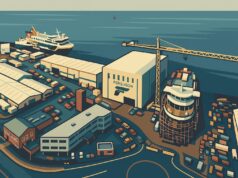
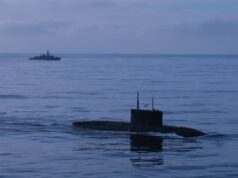
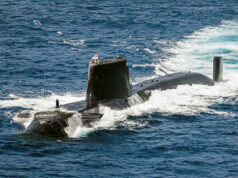
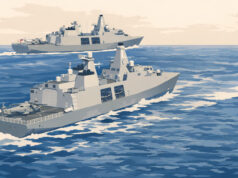
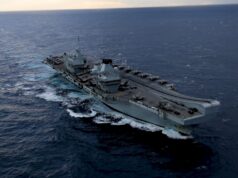
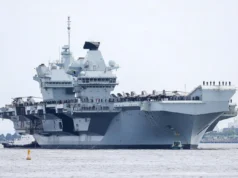

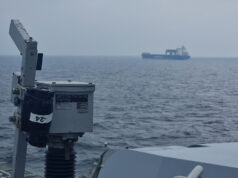

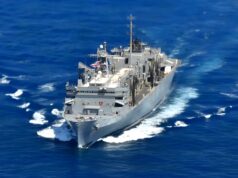

It would be even more cost effective to invest in 1 large shipyard and build the blocks on 1 site. This is what the Germans, French, Koreans, Chinese, Japanese do. We have to do everything we can to make British shipbuilding as cost effective, efficient and competitive as humanly possible.
Stephen G
But its political
Just think of what the SNP would be saying if it was not built in Scotland
Spead around to keep things happy
Those other countries you mention dont have a problem like we do with silly people wanting independence if they dont get there way
..but it won’t be.
Okay, we all know they were in their entirety promised to be built in Scotland at BAE Systems and if we had any sense we also new it was a lie at that time just to win a No vote.
In the real world the workload would always be shared..the unions that supported that no vote were just mugs (…..as they continue to be).
The SNP have every right to be unhappy about this..this is just another reneged promise to join the others (HMRC jobs, Devo-max, Peterhead carbon capture, renewable subsidies, steel jobs, a strong parliament at holyrood) that lost tthem the 5% of votes they needed to win the indy referendum.
No one is saying nothing can be built in Scotland, they are getting the type 26 frigates which will see them through to the 2030s, so we can do what I said on top of that.
any shipbuilding in scotland is a sap to the unions and the s.n.p
Very very sensible, unfortunately that implies long term commitment and strategy. This is the UK we don’t do that unless its financial services and certainly not if its regarded as “metal bashing”.
There will come a time when almost all our ships will be built abroad. The latest one i’ve been involved in (An FPSO for the North Sea was built in China for “peanuts” but to specification)
Our Tory gov, which i expect will be in power for a veryvery long time (I regard Corbyn as unelectable ths far the polls show me to be correct) are interested in one thing and one thing only, the cost…pretty much the same as every other industry in the UK, run by bean counters, hence we in the UK don’t really”do” engineering anymore….at least not compared to our continental cousins.
Our so called captains of industry are a joke.
The shipbuilding costs itself is hardly anything compared to that of the equipment contained within and almost all of that is foreign bar the potable water system (SSS) and a few other pumps.
Without a long term strategy of investment combined with commitment it is inevitable that all UK war ships, like our merchant ships will be built abroad.
These captains of industry above are in it for themselves, short-term profit and for glory, MBE’s, CBE’s etc. ..but they are a consequence of pathetic governance, incompetence within the MOD PE and government general stance of everyone for themselves…fundamentalist capitalism at work i’m afraid. Shame for the workers though. Like me they will be forced to work away from home and/or emigrate.
Absolutely correct Stephen, and that was Drayson’s industrial defence strategy that lead to warship building to be merged and concentrated on the Clyde.
What Drayson envisaged and was not done by his successors was to create a strategic plan that supplied a continuous order stream for new ships that would mean investment in new build technologies. But no, the Treasury insisted on its absurd stop/start, ordering that meant skills atrophied then had to be expensively rediscovered with decades between orders and ships retained in service well after their sell by dates.
UK governments (the Treasury in particular) have no understanding of manufacturing industry and have no desire to learn. All they care about is the financial world of the City. Manufacturing is too low class for them.
whatever, the main issue should be if the battleship drednaught was built at portsmouth in under a year, the clyde should provide the nation with a MINIMUM OF TWO SHIPS PER YEAR.
its time the powers that be ‘firmed up’ and disclosed more about the t 31 programme. i dread to imagine the mess it will be if it goes down the same road as the t26. years late, lower orders, more expensive. upgrade the rivers to a corvette/ light frigate configuration along the lines of the sigma corvettes which are ten feet longer, same width, 5 knots faster, need 20 more crew. yet come with a 76mm main gun, two triple tube torpedo launchers, two quad anti air missile launchers an 3 exocets, another plus is the fact that these ship are already built! 9 new batch 2 rivers light frigates/corvettes would be very welcome at the admiralty. maybe look at the batch 1 rivers and do the same.
We are so stop start as a nation at building up skills and then letting them go. We should have a new approach on so many of our infrastructure industries of which shipbuilding is one.
Let’s have a new long term partnership between Gov, RN, unions and yards to create a great national industry that leverages best of skills to enable us to go after exports because we’ve got long term planning and work loads in place.
Th UK Gov are experts in not having an industrial strategy…i there any basis for optimism?
Th Scot gov have workd wonders with ferguson’s at Port Glasgow, but no equivalent exists elsewhere in the UK, because quite simply no-one cares.
I myself was a naval architect (>30 years ago) and had to leave the industry primarily due to the UK MOD incompetence in order placement and making promises to do this and do that…quite frankly no one cares about shipbuilding..it’ll all be done elsewhere in time
comrade corbyn would love that.
All good points Gents
I don’t mind us spreading the work as long as those in power accept this is sub optimal and factor this into the costing plan. Clearly a single site (preferably with the manufacturing process in a single line that is able to accept 5 vessels at any given point) is far more efficient.
The other key element here is 5 ships of this size are no more than 5 years work and the yards and their owners needs 25 years worth of work to be able to invest properly.
We really need to see a 25 year commitment to 1 T31 and its successors per year over this time period with a commitment at least to spend the £250m on this class (index linked).
Babcock are certainly pulling out all the stops to capture this contract and for that I applaud them.
Now lets get building a world class escort… (4K tonnes, 5 inch gun, sea Ceptor and a wildcat is an escort in my books).
Yes. I am hoping the Type 31s and FSSS are the stepping blocks to facilities that are invested properly (government condition with FSSS and Type 31s as I think Sir John Parker states), that lead to ships other than MOD, but other National requirements (taxpayer funded and not direct) and more commercial and private contracts with UK market dominated ships. Looking at new ship types including autonomous ships, with reports (I will have to find them in my bookmarks if people want to see read them as they are interesting and important). Smaller closer clusters as seen in even South Korea but maybe further as with the case in that Italian cruise ship in which a midship section was towed many hundreds of miles (if it make sense financially and rapid build wise, which would mean financially I guess in some cases if it’s not building an RN fleet up quickly (Higher value ships/contracts too)). Specialisation in certain fields, curved 3d sections off-site but nearish or deck modules to simplify and speed up production to standardise etc, but as I have said before, a study and modelling would be interesting to see in the actual pros and cons. The curved bow and stern sections might be more efficient at building at integration yard with just a big dock and crane with the big sections coming from elsewhere, or vice versa, or a little bit in between. I’d love to have more time and the ability to model this.
speed . get them built quickly
I may be throwing a curve ball or showing my ignorance as someone who has never served, but how much of a departure from the norm would it be to say to the bidding contractors this is what we want (price out the key components, weapons and design) now go away and tell us how much it will cost to integrate and build.
Basically what I’m saying is take away the design authority away from the builders and push costs down as we only pay for the build, not the design. I’m sure there are still plenty of quality people working for mod/navy who could deliver?
Ws
It used to be like that and then the accountants changed it all.
In fairness I think where we have got to with T31, Tides and QE’s is quite good in that BMT have acted as a 3rd party design authority for us.
The main issue is the single source arrangement with BAE who whilst being a UK company do not seem to be very supportive of our armed forces, preferring profit instead of even providing reasonable VFM.
T31 is interesting as it has brought a number of “design houses” into the picture with BMT and Stellar Systems being the 2 most prominent. I was hopeful that both would be given air time, but it looks as though BMT have wrapped this up with the joint Venator / Arrowhead future design. In fairness BMT have virtually created this class on their own and it was even named on another forum (Think Defence) and adopted by the MOD.
I think that goes to show how disorganised the whole process has been.
All your post shows is how appalling ignorant you are.
How so Ron5?
i think his views are valid and calling people ignorant on a public site is the same ron5
Its still one site too many in Scotland. Sorry Fergusons but the SNP queered your pitch with some of us ‘Down South’.
Happy for final assembly to be at Babcock Rosyth as they did a storming job on the QEs but with the Clyde getting Type 26 we now need to feed any other economic growth to the Tyne, Tees, Mersey, Devon and God forbid … reopen Portsmouth?
former naval yards at portsmouth and devonport, maybe even chatham where the yards and estate are still the property of the M.O.D. the clyde needs to be reminded that they are not the only place in town. i think harland wolffe in belfast could match anything on the clyde
Politics should not enter into this as cost and efficiency should be the first consideration as government keeps saying defence equipment costs to much so to many shipyards spread all over the place just to keep politicians happy cannot bring the efficiency required either that our the said politicians must accept the consequences higher cost.
I agree – but in that case a single site “frigate factory” would be the most efficient. Problem is we cant fund efficiency as I suspect the yards on the Clyde could easily knock 2 T26 out every year if they put their minds to it..
Slow and steady is what is required to keep people in work – when actually we should be building stuff and selling it even at break even or a slight loss just to maintain tempo in a set of strategic industries (Steel, Shipbuilding, Design, Engines etc. Etc)
RH – well when its the taxpayer’s money politics has to come into it. After all, for good or bad, we do elect them to look after those same taxpayer pounds. And to me the politics says we should not focus all the benefits into one area. The QEs proved that point well.
I also don’t buy into the ‘frigate factory’ because to create the same manufacturing capacity as already available in say 3 sites would need a very large area and £ Bns of ‘investment’. And my point is ‘why?’. Why duplicate what we already have? We must use what we have where it is and spread the benefits of taxpayer funded purchases. For example the Tides should and could have been built here and the short sighted ‘lowest price’ assessments of a UK bid should be ‘lowest cost to the Nation’. By which no ship would ever be built abroad.
And certainly no extra to go to Scotland. They have the Type 26 and the built most of the QEs. Enough already
use the capacity we have better the clyde monopoly is a disgrace, nothing to do with providing the nation, its produce is habitually overpriced, late,and not always better than systems from elsewhere.
Get Devonport building again
We are not alone in this splitting across the nation to win votes system. Whenever we see an announcement from the US it is always supported by a break down by how much is going to which state. It is ultimately the core problem of democracy that politicians first priority is to get revoted and so focus on getting positive local stories ahead of the overall interest of the country.
In the end we need to start building ships and if this is the only way to plassify the various political self interests, then so be it. It will however mean that export orders really need to be taken off the shopping list, at least from a building perspective, maybe some design sales will happen with foreign builds.
That is because in the US the Military and the defense sector companies that support it along with Congress learned to distribute work along as many areas as possible. You have to keep in mind the US is a Federal Republic. So it’s both how many Senators 2 per State and how many Congressman determined by population can be fit into one contract. Then to make it more complicated no one is going to say cancel a cancel a major procurement program or close a major base in Florida or Ohio in an election year (if ever). If they do they get thrown out of office. Often in the primaries before they even get to the election.
The effect of this are the following: 1. Very little will to make large defense cuts 2. Creating a widespread general will for defense spending. 3. Seemingly unconnected events effecting who gets contracts- Your Senator from a relatively small state is the swing vote on major legislative action? Guess which states largest employer got 3 more destroyers ordered.
The final and largest effect is while congressmen and senators fight over whose districts get which program. They have agreement that there is one thing they hate more than the other party. ANY slice of the pie going to a foreigner.
If someone in America on the appropriations committee had suggested buying logistics ships made in South Korea. Well he wouldn’t have to wait for the other party to get him out of office. He would have to chose between resigning in disgrace or thrown out at primary time.
Politics certainly gets in the way in the US. But you don’t have anything like the cost and time overuns we get. A rule of thumb here is whatever the original cost. Double it. The contractors, brass and civil servants blame each other and no-one else knows who to blame.
as for the good old u.s of a as the only level 1 customer in the f 35 programme, the u.k order should be given priority in the the production stage of the aircraft building.
Bottom line is their just isn’t enough UK warship orders to sustain multiple companies at multiple sites. There hasn’t been enough since the 1980’s.
A false bubble of work has been created with the the idea of building the dumbed down Type 31’s. When that work is done in 10 years time whoever wins the Type 31 business will go bankrupt because there is no follow up work.
When the Type 26’s are compete we will be back where we started with the government being forced to award the next warship class (the Type 45 replacement) to Bae or to give the business to a French or Italian shipyard.
Short sighted nonsense from the Treasury/MoD yet again.
any major fabricating company with access to the sea across the WHOLE u.k should be included in building the modules, spread the work around, benefit more areas, with jobs maybe get things done faster and cheaper.